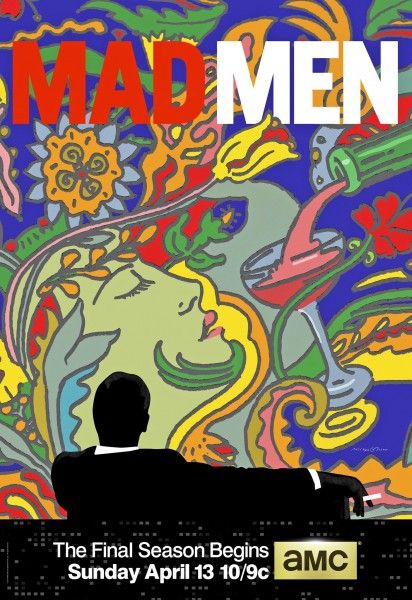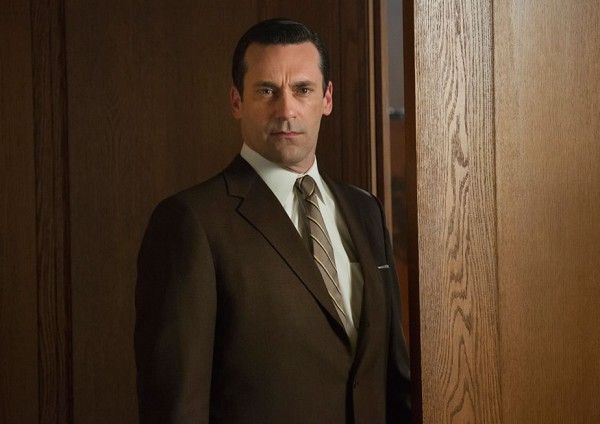The counterculture is in full swing, can ya dig? If you come away with nothing else from this hour of Mad Men, "The Runaways" at least was very clear that things are crazy, man, and the times they are a-changing (and that's where I'll stop, I promise). There are those who are left behind, and those are flowing with the change, and the chasm between them is growing wider. For Don, though, it's an opportunity. This seventh season has shown the miracle of change for Don -- but is it just adaptation? Hit the jump, you bunch of flag-burning snots!
Don's transformation from a boozy adulterer to a man of the straight and narrow (kinda) has been surprisingly easy to believe in. But a clue to the real reason for it was dropped during his speech at the Philip Morris meeting. Don is no fool: he saw the writing on the wall. Mad Men has spanned a time of incredible change, yet Don has always been a constant in a world very much in flux. Like at the party at Megan's, he's usually on the outside looking in, dabbling, but not fully immersing himself. Unlike Roger, Don hesitates to jump in to the latest fad, but even he has to acknowledge that those like him -- those like Lou -- were on the way out. To survive, he needed to change. Or adapt.
Don's appeal to Philip Morris was, as he put it, not about changeability, but about loyalty (something I just wrote extensively about in my Game of Thrones review, so pardon the overlap!). He changes to stay alive, and it is about a loyalty to his company; if you are with him, then you're protected by him (and from him). Clients come and go.
This isn't just lip-service though, it's been clear over the last few episodes that the only things Don feels he can hold on to is SC&P. It's his life blood. Though the new world order of reporting to Lou and being part of Peggy's team was a hard pill to swallow, he's done it. As Freddy told him: do the work. He has done so, because he'll do anything to save his life with the firm.
Other things in his life are not so clear. Though Megan seems ready to forgive and forget, she's jealous that Don would fly out at the drop of a hat for Anna's niece Stephanie, and then take off once Stephanie was gone. Her attempts to let Don "cheat" with her (as she assumes he's doing without her in New York) also fell flat. He participated, but it had no lasting effect. His focus is with work, as it always has been. It's the crux of the man he created, and cannot let die. If he does, who is he then?
But Stephanie also represented how integrated Dick Whitman is with Don Draper's life now, as he's living in a more honest place. It was telling how his face lit up when he spoke with her or about her. Maybe it was reminding him of the comfort of Anna, and of a life without lies. Megan should also be a part of that, but Don relinquishing control at work does not extend to his home. It's something Megan says to Stephanie before she essentially pays her to leave. If you stay, Don will try to control you. Here's some cash, and your freedom. Run.
Per usual, Betty's story acted as a nice companion piece to Don's issues. Betty is also struggling to adapt to a new world. She has changed since her days with Don, but she still clings to certain aspects of her past, like being semi-competent arm candy and a mean mother. Her relationship with Henry, who in the past has always been so patient and compassionate with her, is also telling. In this era of change, Betty is starting to awaken a part of herself that she has long kept dormant. She doesn't want to be told what to think or where to sit, she wants to do what she wants, have real discussions, and be able to have her own agency in life. This is a side of Betty that has fought to come out for a long time, and the repression of which has led to some of her most diabolical moments. Letting it go free might be the most interesting thing she's ever done.
And then there are the casualties of change, like poor Ginsberg. We all have known for a long time Ginsberg was a little off, but things have been escalating on that front for awhile. The advent of the IBM computer -- the most obvious agent of change on the show -- was one that sent him careening over the edge. His destabilization and breakdown were interesting foils for Don's triumph in the hour, and illustrated the stakes of what happens to those who don't learn how to adapt (or run).
Episode Rating: A-
Musings and Miscellanea:
-- I'm still very uncomfortable and jumpy about everything regarding Megan in the mountains. I have been convinced she is due for a gruesome end, and every mention of murder makes me suspicious of foreshadowing. Speaking of her though, wasn't she out of place at her own party? That bouffant hair and micro-dress were very mod, not hippie. The free-spirits at her abode didn't seem to match her own sensibilities.
-- I can't stand Lou, but I actually kinda liked Scout's Honor (however derivative).
-- Ginsberg's breakdown was epic. His lines about the computer controlling everyone were so convincingly delivered I half believed him (in the surrealism of Mad Men's world sometimes, who knows?). That nipple in a box, though … Ginsberg has always had a weird sense about him. His introduction to the show was in the wake of murders and a deadly fog, so it's unsurprising he would leave on such a note. His final appeal for them to get out while they can had a lot of meaning though, not only within the episode's theme, but also perhaps in the more far-reaching idea of computers taking over worker's jobs. Soothsayer! Cassandra!
-- Julio coming over to hang out with Peggy had me in stitches.
-- Stan was so sassy in this episode! I'm amazed sometimes they don't fire him.
-- And again, Mad Men has the most beautiful nightwear. That beautiful robe! I want I want.
-- PSA: Never sword fight with golf clubs.
-- Sure Stephanie, nothing happened between you and Don, but you know he wanted it! (back in the day, not anymore. I don't think). She was all about the 60s lingo though, wasn't she? Putting it on a little thick, it seemed.
-- For once, Harry was not totally useless.
-- I want to quote everything Betty, Henry and Sally said in this episode, but I'll suffice with some of these gems: "You ran unopposed!" / "Leave the thinking to me!" / "Where would mother be without her perfect nose?" / "It's a nose job, not an abortion." / "I'm not stupid. I speak Italian."




